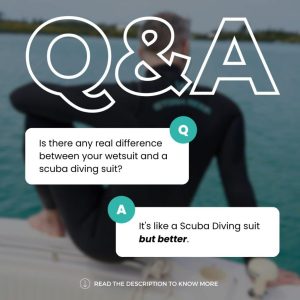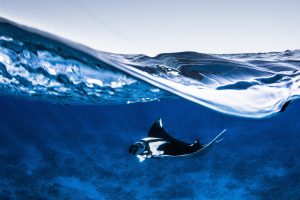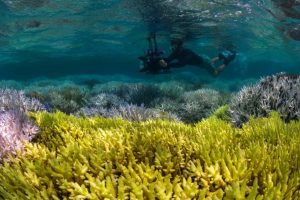Potoz Morunga Rudolph (inset) is thankful to her rescuers but wants to warn of the dangers at Pataua, after nearly drowning at the edge of Pātaua Bar. Photo / NZME
“Help me, I don’t want to die,” were the first words an Auckland mother-of-five remembers saying to her rescuers during her near-drowning at Pātaua on Saturday.
When Potoz Morunga Rudolph was pulled from the water, her whānau diving with her were not even sure she was alive.
Despite the trauma, she is sharing her story to raise awareness of the dangers of the popular Northland spot and the risk of a gear malfunction, as well as thank her rescuers.
Morunga Rudolph, from West Auckland, has been freediving since she was 15 and trained in scuba diving, so she thought nothing of going for a free dive off the rocks near Pātaua Bar on Saturday afternoon.
“I went to go and get some seafood with my whānau,” she said.
The tide was going out, so the group of divers jumped into the estuary at Pataua South and caught a ride on the current.
But as Morunga Rudolph was heading out, her weight belt slipped from around her waist and, before she could kick it off, it caught on her knife secured to her ankle.
With her weight belt pulling her leg down, she also became stuck between the outgoing current and the 1m swell coming in just by Pataua Bar.
“I was telling myself ‘don’t panic, you’ve got this’ and trying to relax on my back, but at the same time the waves were crashing over me and my snorkel came loose from my goggles,” she said.
“I soon realised every attempt that I was trying to do to release the belt from my leg just wasn’t working. The panic set in and I just started screaming for help.”
Morunga Rudolph said her brother, who was already at the rocks and diving for kina, had come up to clear his fogged goggles when he heard her screams.
As he struggled against the current to get to her, he saw a couple in a nearby inflatable dingy, yelling at them to help and pointing to where his sister was.
/cloudfront-ap-southeast-2.images.arcpublishing.com/nzme/ATCGQGZWCFEVJH6CBQE5GT6BQQ.JPG)
“He said they looked over and just saw hands in the water.”
Morunga Rudolph said when the inflatable dingy came to her, she grabbed onto the woman and wouldn’t let go.
“I just looked at her with so much fear in my eyes and said, ‘help me, I don’t want to die’. My kids were on my mind, my whānau were on my mind.
“They [the people in the boat] kept repeating, ‘you’re alright, we’ve got you’.”
Morunga Rudolph admitted she is not a small woman and it took the help of others – including people in another boat and a surfer – to get her into the boat and get her ashore.
Her first concern was to reassure her brother and sisters that she was okay.
“I wanted them to carry on but at the same time, I was so short of breath. I tried to sit up but my energy was so low.”
When Morunga Rudolph saw one of her sisters, she grabbed her, hugged her and broke down in tears.
“I just started crying, realising how close I came to not coming back.”
Emergency services came to the scene and found Morunga Rudolph had low oxygen and low blood-sugar levels.
Despite her fear of heights, she was convinced to get into the Northland Emergency Services Trust’s rescue helicopter and was flown to Whangārei Hospital.
There, Morunga Rudolph was given oxygen and a chest x-ray found she had water on both sides of her lungs. She was released after several hours, with instructions to watch for signs of pneumonia in the coming days.
While Morunga Rudolph was well prepared, she said she will never again strap a knife to her ankle and she will make sure her weight belt is properly tightened.
But she also wanted to warn people about the risks at Pātaua, which can have a dangerous combination of tidal currents and surf for even the most experienced divers.
“Tangaroa [the god of the ocean] doesn’t care who you are – if you’re going to get into trouble in his domain, he’s either going to give you up or take you,” she said.
Morunga Rudolph would also like to thank her rescuers, including emergency services, the rescue helicopter and all the bystanders who helped.
She particularly would like to get in touch with the couple in the dingy, who she thinks were named Amelia and Alex.
“I don’t know how many times I can thank them for saving my life and for being in the water at that time.”
Morunga Rudolph’s brother has renamed them the “two angels in a boat”.
Do you know more? Contact us at reporters@northernadvocate.co.nz if you helped in the rescue
Timely reminder of Water Safety Code
Morunga Rudolph’s near-drowning is a timely prompt about the Water Safety Code, which Water Safety New Zealand says consists of four simple rules to remember each time you venture near the water:
- Be prepared: Learn to swim and survive; always use safe and correct equipment; know the weather and water conditions before you get in.
- Watch out for yourself and others: Always pay close attention to children, swim or dive with others and in areas with lifeguards.
- Be aware of the dangers: Enter shallow and unknown water feet first, obey all safety signs and warning flags and do not enter the water after drinking alcohol.
- Know your limits: Challenge yourself within your physical limits and experience; learn safe ways of rescuing others without putting yourself in danger.
Denise Piper is a news reporter for the Northern Advocate, focusing on health and business. She has more than 20 years in journalism and is passionate about covering stories that make a difference.


